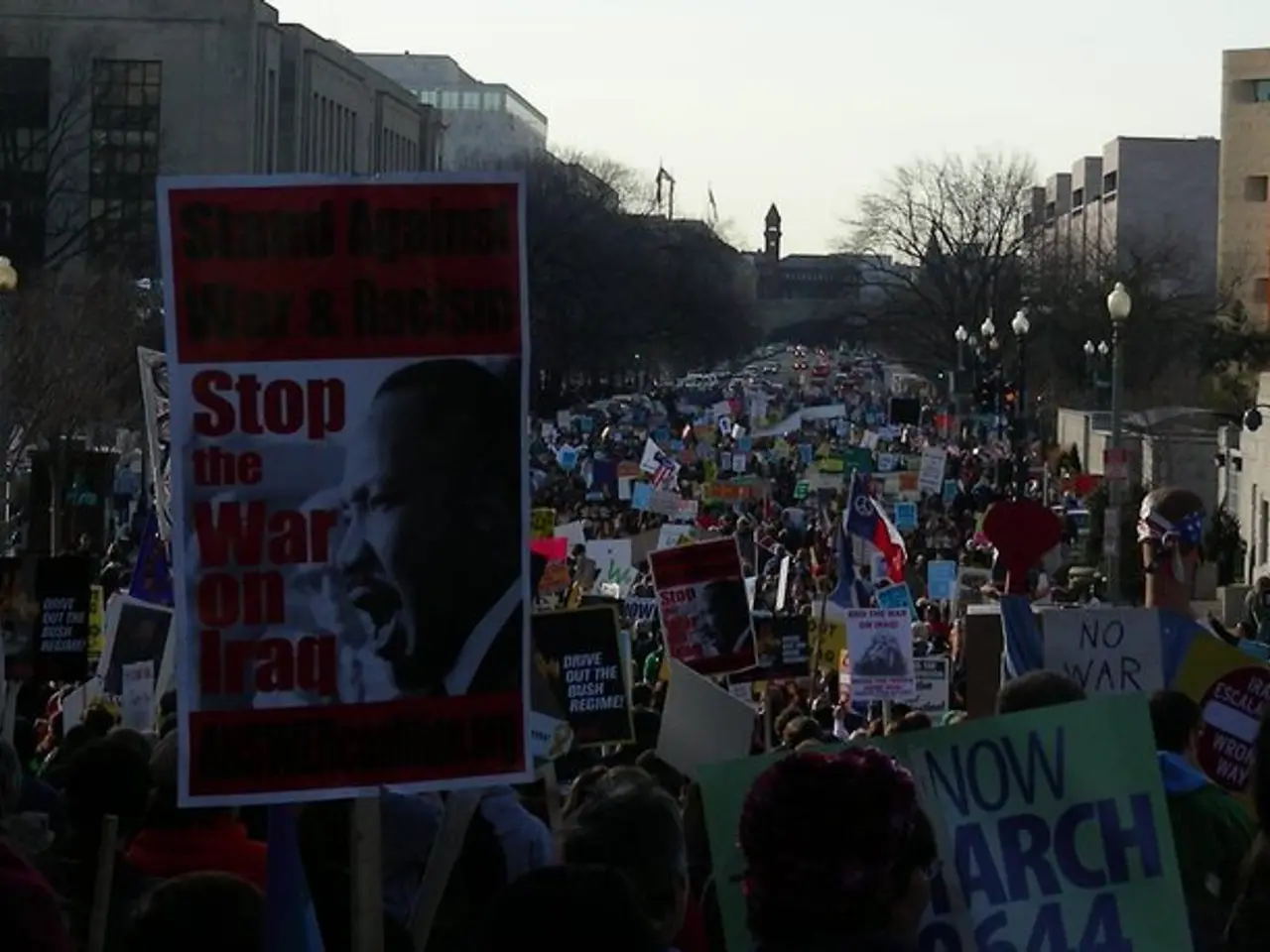Protests in London over the Palestine Action ban result in over 460 arrests
In the heart of London, Parliament Square played host to a demonstration on a recent Saturday afternoon, organised by the campaign group Defend Our Juries [1]. Hundreds of people had gathered, their voices united in a call for change, as they demonstrated against perceived insufficient UK government policies regarding Israel’s actions in the ongoing conflict in Gaza and the West Bank.
This demonstration was significant, reflecting widespread public outcry against the humanitarian crisis. Protesters urged the UK government to condemn Israel, impose sanctions, and end weapons supplies [1]. The event followed a series of targeted demonstrations, such as the August 16 protest outside RAF High Wycombe, where pro-Palestinian activists demanded an arms embargo on British weapons exports to Israel [2].
However, the atmosphere was far from peaceful. The same day witnessed eight additional arrests for offenses including five assaults on officers, during a single operation in central London [1]. This operation came after the arrests of over 460 people in the city for supporting Palestine Action, a group that was officially banned as a terrorist organisation by the UK government [3].
The ban on Palestine Action has led to membership in the group becoming a criminal offence, with a maximum sentence of 14 years in prison [3]. The co-founder of Palestine Action, Huda Ammori, has secured leave to bring a legal challenge against the prohibition [3].
The demonstration in Parliament Square, estimated to have around 500-600 people initially present [1], was met with a significant policing presence. The Metropolitan Police drew officers from other forces to manage the event, which was anticipated to result in large numbers of people being detained [1]. In the end, Saturday night saw more than 460 arrests in central London for supporting Palestine Action [1].
The ban on Palestine Action and the subsequent arrests have sparked heated debates about protest rights and government counterterrorism measures. While some argue that the ban is necessary for public safety and national security, others see it as a restriction on free speech and peaceful protest [1].
This period of intensified activism around Palestine in the UK is set against a backdrop of severe regional conflict and contentious domestic security responses [1][2][3]. The largest demonstration relating to Palestine Action since its ban occurred on August 9, 2025, in London, where approximately 300,000 people participated [1]. This demonstration, the 29th national march, marked one of the largest turnouts, driven by growing public awareness of the ongoing violent conflict in Gaza and the West Bank, which involved a death toll exceeding 60,000 [1].
The implications of these events are far-reaching. They include a sharp increase in large-scale public mobilization in the UK around Palestine-related issues despite official bans on groups like Palestine Action [1]. They also highlight heightened tensions between protest rights and government counterterrorism measures, as activists risk arrest to publicly oppose the ban [1]. Additionally, they increase pressure on UK authorities to reexamine arms exports and diplomatic policies regarding the Israel-Palestine conflict amid growing grassroots activism [1].
The government’s firm stance on Palestine Action signals a willingness to classify some activist tactics as terrorism, which may both deter and inflame protest activities [1]. These developments underscore the complex and evolving nature of activism and security in the UK, as the nation grapples with balancing the rights of its citizens to protest with the need to maintain public safety and national security.
[1] The Guardian, "Palestine Action banned as a terrorist organisation by UK government", 1 September 2025. [2] The Independent, "Pro-Palestinian activists stage protests across the UK demanding arms embargo on Israel", 15 August 2025. [3] BBC News, "Palestine Action co-founder to challenge ban as terrorist organisation", 5 September 2025.
The demonstration in Parliament Square, which called for an end to UK government policies regarding Israel's actions in the ongoing conflict in Gaza and the West Bank, was a part of the larger context of general-news events, including heated debates about protest rights and government counterterrorism measures [1]. The event followed a series of protests, such as the one outside RAF High Wycombe, which focused on the issue of crime and justice, as protesters demanded an arms embargo on British weapons exports to Israel [2]. However, these protests were met with harsh responses, leading to numerous arrests for supporting Palestine Action, a group banned as a terrorist organisation by the UK government [3].




